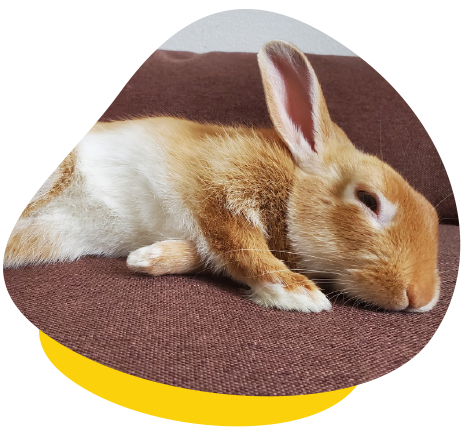
What is Floppy Bunny Syndrome?
Floppy Bunny Syndrome is a condition that usually presents with acute onset of generalised weakness or flaccid paralysis of the body, resulting in the rabbit’s inability to hop around or, in severe cases, not do anything but lie on their sides.
The sudden onset of this condition can display varied symptoms of an apparently healthy rabbit and can often present over a 1–12 hour period.
There appears to be no breed or age predilection for rabbits described with this syndrome, with the following signs generally seen:
- No or little movement in back legs, front legs, or both
- Generalised weakness or paralysis
- Not drinking or eating (or a decreased appetite)
What causes Floppy Bunny Syndrome?
The correct answer is no one knows for sure what the exact cause is. The symptoms listed above can occur in many conditions. Blood tests and further investigation can sometimes result in a definite diagnosis of one of the conditions covered below.
Is This Condition Fatal?
Unless the underlying cause of these symptoms is identified, this is a question that cannot be answered. Many conditions that cause similar signs can indeed cause death if left untreated. At a bare minimum, if supportive treatment is not initiated, a decrease in food and water consumption can result in dehydration, collapse, and death.
The good news is that our rabbit vets have a very good success rate at being able to save most bunnies that present with this condition.

What Conditions Can Cause Floppy Bunny Syndrome to Occur?
- Hypocalcemia (low calcium) – A condition seen in lactating rabbits.
- Hypoglycemia – A common condition in young rabbits recently rehomed with a change in diet and possible secondary coccidia infections. A simple blood glucose test can help to confirm this. Treatment is often successful if aggressive and instigated quickly.
- Hypokalemia – A rare condition sometimes associated with rabbits diagnosed with Floppy Bunny Syndrome is caused by low blood potassium. This may be due to malabsorption or low dietary level.
- Hypothermia – A decrease in body temperature is often a secondary complication to many conditions, from gut stasis to spinal trauma.
- Hypotension – Low blood pressure is common in collapsed rabbits for many reasons, from gut stasis to heart disease.
- Dehydration – Rabbits can dehydrate very quickly and can hide the initial signs of this critical condition until they collapse and show signs often attributed to Floppy Bunny Syndrome. A simple blood test to measure red blood cell count and total protein in the blood can help diagnose this common condition.
- Infectious Causes – Encephalitozoon cuniculi, a protozoan (parasite) that can cause many symptoms.
- Spinal Cord Damage – Rabbits are often keen climbers and even though a fall may not have been observed, it should always be suspected. X-rays of the spine and hips should always be considered.
- Musculoskeletal Pain – Conditions such as arthritis, muscular pain or other spinal conditions may present with similar signs.
- Selenium Deficiency – Nutritional muscular dystrophy either due to a diet lacking in selenium or the Vitamin E necessary to process selenium.
- Ingestion of Toxins – This may be seen in garden plants, even if the rabbit has lived in a garden for years, or hay or feed contaminants.
- Weather Changes – We have no peer reviewed evidence to back up this potential cause however interestingly we seem to see more cases when there is a sudden change in weather conditions, particularly humidity levels.
In some cases, the cause of the Floppy Bunny Syndrome cannot be identified.
What Can I Do if I Suspect Floppy Bunny Syndrome in My Rabbit?
The first thing to consider is undertaking a few simple blood tests to try to find the underlying cause. If these tests are not conclusive, there are two main paths to consider.

1. Further Investigation
This is ideal for your rabbit and allows us to understand the possibility of an underlying cause in rabbits that show unexplained signs commonly attributed to Floppy Bunny Syndrome. Further investigation may include more detailed blood tests and further imaging with x-rays or a CT scan.
2. Supportive Care
Many owners choose to invest time with a high commitment to nursing care. It should be noted that recovery may not be possible if further investigation has not ruled out more common conditions.
Nursing care can consist of hydration (fluids either via an IV drip, orally or by injection), feeding (syringe feeding with critical care every 2-6 hours – 60ml of the made-up solution per kg of body weight per 24hours), hygiene (changing of bedding every 2 hours or as needed), movement (changing of position and massage every 2-3 hours), pain relief and gut motility medications.
Floppy Bunny Syndrome is a horrible condition that comes on quickly; however, with the proper tests and treatment, many rabbits can survive and make a full recovery.
If you are at all concerned about your rabbit or they’re showing any of the symptoms listed above, please get in touch with us to book an appointment.


